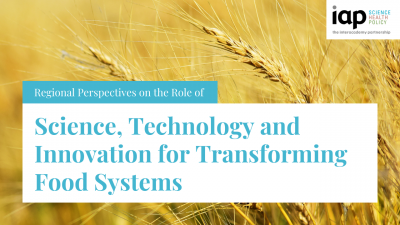


Some 100 people from all over the world attended 'Regional perspectives on the role of science, technology, and innovation for transforming food systems', the webinar organised by the InterAcademy Partnership (IAP) as a side event at the science days for United Nations Food Systems summit (UN FSS) 2021.
The recording is now available on the IAP YouTube channel
As highlighted on the Scientific Group's website, there is concern that the global prospects for food and nutrition security are worsening, and exacerbated by the converging crises of climate change and COVID‐19, but there are also unprecedented opportunities to capitalise on scientific advances to transform food systems.
This online IAP event brought together work by regional academy networks in Africa (NASAC), Asia (AASSA), the Americas (IANAS) and Europe (EASAC). Each network recently contributed a Brief to the UN FSS, drawing on issues from the previous IAP Food, Nutrition Security and Agriculture (FNSA) project.
Recognising diversity within and between regions but also commonalities, contributors emphasised the importance of taking a transdisciplinary approach to finding solutions for food systems, and encompassing multiple steps from growing, through to transport, retail, consumption and recycling.
Furthermore, in the transformation of food systems towards social, economic and environmental sustainability, it is also essential and urgent to take account of pressures on other natural resources such as soil and water and of the continuing objective to avoid further damage to biodiversity.
Among key points made in focusing on solutions were:
Invited discussants and wide‐ranging Q&A highlighted the importance of connecting common opportunities to local solutions, neglected and novel food sources and innovation in food processing. Drawing on COVID‐19 experience raised issues for understanding complexity and systems thinking for building flexibility into transformative approaches to strengthen resilience to multiple shocks.
It is concluded that there is a wide range of scientific opportunities at the frontiers of nutrition and elsewhere for sustainable and healthy food systems that, when mapped onto the UN FSS Action Tracks, can stimulate innovation, guide practice and inform policy decisions. Capitalising on these opportunities requires commitment to trans‐regional and transdisciplinary research efforts, building and sharing scientific expertise and facilities, with initiatives for training the next generation, and promoting engagement at science‐policy interfaces, integrated at national, regional and global levels.
